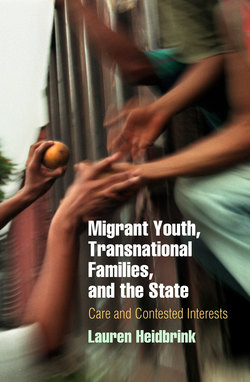Migrant Youth, Transnational Families, and the State

Реклама. ООО «ЛитРес», ИНН: 7719571260.
Оглавление
Lauren Heidbrink. Migrant Youth, Transnational Families, and the State
Отрывок из книги
Migrant Youth, Transnational Families, and the State
Bert B. Lockwood, Jr., Series Editor
.....
Unaccompanied children as a juridical category justifying institutional and legal intervention discounts the significant variation in experience, context, and social relatedness of children across cultures. “Always embedded in broader structure, child agency, like adult agency, is inevitably partial and conditioned by multiple factors” (Coe et al. 2011: 9). Categorically ignored, the agency of migrant children and youth is conditioned by their upbringing with notable differences across culture, age, gender, family position, sources of caregiving, and social obligations. Financial and social indebtedness, language, emotionality, and household economy may encourage, deny, or make relevant or irrelevant child agency (Coe et al. 2011: 15–16). A child’s agency may be contextualized by his or her experiences of (dis)empowerment, access to knowledge and information, employment or labor, and exposure to trauma or violence. Children maintain individualized capacities for innovation, creativity, strength, and resilience that may shape their ability and willingness to express agency either actively or passively.
The burgeoning field of new childhood studies recognizes children and youth as actors in their own right and whose worldviews are worthy of inquiry. Scholars have argued that youth are both “makers and breakers” engaged in dynamic social processes of making and being made (Honwana and de Boeck 2005; Maira 2009). In this vein, I engage youth less as agents in process of “becoming,” instead focusing on their “being.” Youth negotiate complex networks of actors and institutions that may aid them in evading deportation, earning income, and contributing to household economies in the United States and in their home countries. Considering only the structural forces on youths’ lives and reducing childhood and youth into periods of transition or molding threaten to negate their contributions as social actors. Youth challenge, resist, or shape the law and institutional practices. Youth may understand the law differently than adults and their experiences may differ across time and space, and through an examination of their everyday interactions and confrontations with institutional networks and legal systems, youth shape the very laws that govern their everyday lives. Through my research, I came to realize that migrant youth reflexively understand social agency, not as an act of one’s own free will but as a responsibility, a form of belonging, or a mode of being. Thus, an analysis of agency and rights becomes central in the narratives of migrant youth in the ways they cross physical, social, and metaphoric borders and reside in overlapping spaces of impossibility—be it social invisibility, illegality, or independence.
.....